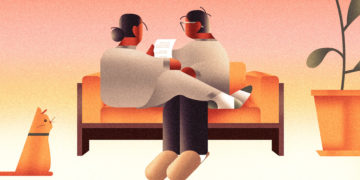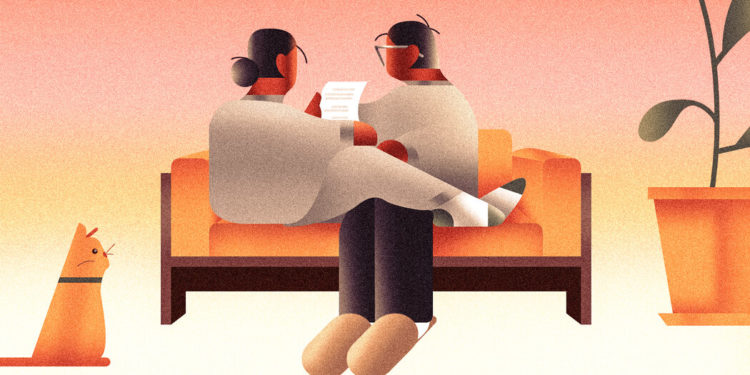On Dec. 2, Rachel Birthistle and Roberto Bernasconi stood in front of their wedding guests at Passalacqua, a luxury hotel on the shore of Lake Como in Italy. The gathering was intimate, and the space charming. Everything felt traditional — until the vows.
At the appointed time during the ceremony, the bride and the groom handed each other a sealed envelope. Ms. Birthistle silently read Mr. Bernasconi’s first. Then it was his turn. Guests watched on as music, instead of the sound of the couple’s voices, filled the space. Several minutes later, the two were pronounced husband and wife.
“I was concerned there’d be an awkward pause, and I’d see people get shufflely,” said Ms. Birthistle, 54, a wedding planner and the owner of the Lake Como Wedding Agency. “But that didn’t occur.”
When she finally glanced up at their guests, many were crying, she said, adding that “the whole experience was unexpectedly meaningful, especially when I could see the emotions and expressions on Roby’s face and know what part of my vows he was reading.”
Vows have long been a classic part of weddings, but some couples are turning the moment into something more intimate.
The online wedding company Zola, which recently surveyed more than 5,000 people with weddings planned for 2025, said in a report that a vast majority of respondents thought exchanging private vows was trending and loved the idea.
Secluded vows may be especially appealing to those who are shy or feel pressured by family or friends to come up with the perfect soliloquy. Tevin Wooten, 31, and Chaz Glick, 34, will share their declarations after first looks at the Langham Hotel in Boston on July 18. They, too, are choosing personalized self-expression over public performance.
“We wanted every element to be intentional and ours, especially when so many weddings are feeling the same,” said Mr. Wooten, a meteorologist for NBC Boston.
Turning their vows into a private exchange was one of the couple’s first decisions after their engagement. “The ceremony is for our guests; the vows are for us,” Mr. Wooten said.
Some industry professionals attribute the desire for privacy to a welcome pushback against — and a consequence of — the overexposure that social media has brought. “Over the last year, it’s come to light that people are protecting their relationship,” said David Beahm, the founder of an event design company in New York that organizes more than 40 weddings a year. “They’re stepping away from having their lives on display to make sure a connection between each other is established first.”
In September, Mr. Beahm officiated the wedding of a friend’s daughter at the Shawnee Farms Estate in Luray, Va. The couple said personal vows before the wedding, and only the standard “Will you … ” exchange was uttered publicly. Mr. Beahm couldn’t say for sure when and where the vows specifically took place, “as they went off and did their thing. It was probably after first looks, but no one knows for sure because the exchange was sacred and just for them,” he said.
The ways in which the vows are exchanged can be as creative and customized as weddings: in written notes, on an empty beach, in sweats, over coffee, at sunrise.
Catherine Colford shared vows with Hunter Gardner, then her fiancé, one night in October, on their outdoor porch in the Boerum Hill neighborhood of Brooklyn, two weeks before their wedding. “We wanted our exchange to be a mini celebration for just us,” said Ms. Colford, 35, a senior partner at Maverick Creative, a public relations agency specializing in travel.
Mr. Gardner, 37, a communications manager at Plant Powered Metro New York, a nonprofit organization that champions plant-based nutrition, felt similarly. “I wrote my vows in three different sittings and then hand-wrote the final version,” he said. “After saying them, it felt different, and we felt different about each other.” (At their garden wedding, at Frankies 457 Spuntino in Brooklyn, they recited traditional, shortened vows in front of their guests.)
Other couples are exchanging vows after the wedding. Allison Hooley, 30, said that after she and Samuel Sweet, 31, were married on Dec. 14 at St. Paul Parish in Hingham, Mass., and guests had exited the church, the two of them “ducked out to a secluded spot at the back and read each other’s personalized vows, which we wrote down in books.”
She said, “We could hear everyone exiting, but no one could hear us.”
While people may welcome the intimacy offered by private vows, something else may be lost: the opportunity for guests to learn more about the bride and the groom’s relationship journey. Sushma Dwivedi, a Hindu priest, said she finds exchanging vows in public “to be one of the best parts of the wedding, as it lets guests become part of someone’s love story.”
“If you’re attending as a guest, vows are a moment for you to understand the couple’s relationship history,” Ms. Dwivedi added.
Still, she appreciates and understands a couple’s desire for private vows. “We’re moving away from wanting to share everything,” she said. “This is a small way of retaining something for themselves.”
Even when couples choose privacy, it doesn’t necessarily mean that guests need to miss out on hearing about a couple’s story. Officiants, already the masters of ceremonies, are helping to tell it. In fact, some are encouraging the shift.
“The letter exchange was our officiant’s idea,” Ms. Birthistle said. “Our celebrant did a great job telling our story, so we didn’t feel like we lost anything.”
The post You Are Cordially Invited to Our Wedding. But Not to Our Vows. appeared first on New York Times.



















